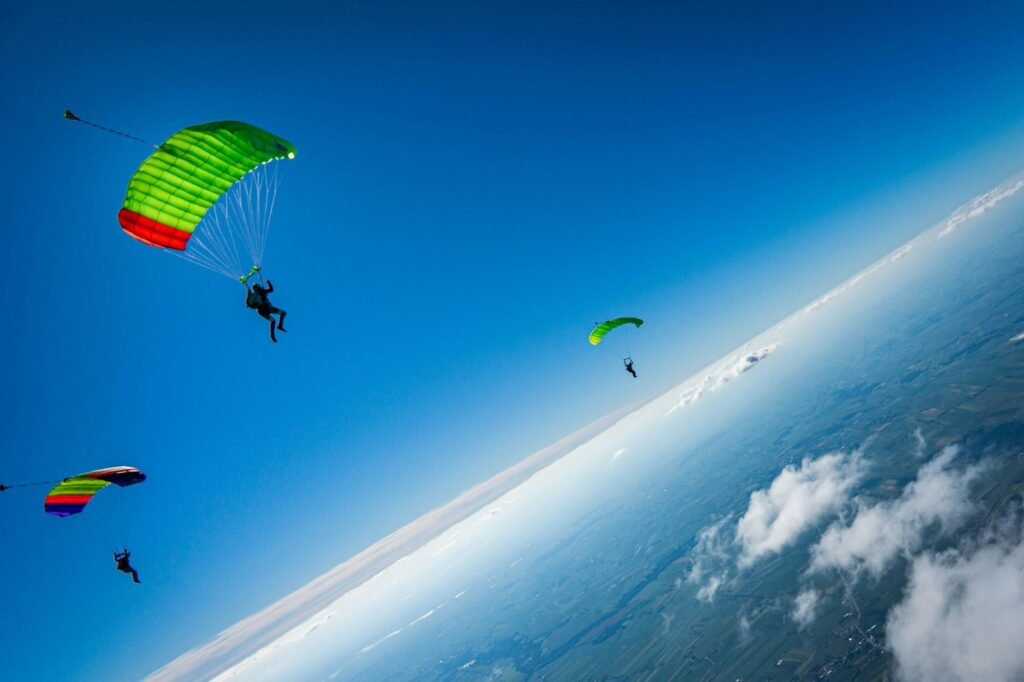Let’s address the elephant in the sky: does skydiving hurt? It’s a totally fair question. You’re jumping out of a plane, falling at 120 mph, strapped into a harness… it sounds like it might come with some kind of physical discomfort, right?
But here’s the honest answer: skydiving isn’t painful. In fact, for most people, it’s way more comfortable than they expect. That said, there are a few things you might feel—and this article will walk you through them, so you know exactly what to expect.
Short Answer
Skydiving isn’t painful—most people find it far more comfortable than they expected. You might feel a brief harness tug or slight ear pressure, but nothing intense or lasting. The experience is smooth, safe, and more about joy than discomfort.
Tip: How old do you have to be for skydiving?
The jump itself: no impact, no stomach drop
First things first: freefall doesn’t feel like a roller coaster.
When you jump from the plane, you accelerate quickly, but the transition is smooth and supported by the rush of air. You don’t feel a gut-wrenching drop. There’s no “whiplash” moment. It’s more like floating face-first through fast-moving air than it is like falling.
And guess what? Your stomach doesn’t drop. That roller-coaster stomach sensation happens when your body changes speed rapidly, like on a sudden drop. In skydiving, you accelerate for a few seconds, then reach terminal velocity and stay there. It actually feels calm and stable.
Tip: If you’re not sure where to skydive, you should check some of our reviews.
Harness comfort: snug, not strangling
You’ll be wearing a harness, securely fastened around your shoulders, chest, hips, and legs. Is it tight? Yes—it has to be. But is it painful? Not at all. The harness is designed to distribute pressure evenly, so you’re not being squeezed in one spot. During freefall, you’re practically weightless, so you barely feel the harness at all.
The only time people report a little discomfort is right after the parachute opens, when the harness tightens briefly as your body shifts from horizontal to vertical. This moment lasts just a few seconds, and for most people, it’s more surprising than painful—like a firm hug from the sky.
Tip: Ever wondered if skydiving is good for anxiety?
Ears and altitude: pressure changes
If you’ve ever flown on a commercial airplane, you know that changes in altitude can affect your ears. Skydiving is no different. On the way up in the plane, you might feel a little pressure in your ears. It’s the same as during takeoff—just swallow, yawn, or chew gum to equalize.
During freefall, you’re descending quickly, but the pressure change isn’t as sharp as you might expect, so it’s usually not a big deal. If you’re prone to ear issues, let your instructor know—they’ll make sure you’re feeling good before you jump.
Tip: skydiving for the first time? Check out the mistakes you should avoid.
Landing: gentle, not jarring
Another common concern: Isn’t the landing hard on your knees or back? Not at all. Tandem instructors are trained to land you softly and safely. Most landings involve:
- A gentle slide on your butt (especially if the ground is soft)
- Or a few easy steps, like jogging it out
You’ll lift your legs before landing so your instructor can absorb the impact. It’s smooth, controlled, and designed to protect both of you. No superhero crash landings here—just a safe, simple return to Earth.
Tip: What is a tandem jump in skydiving?
Muscle soreness? sometimes, but minor
After your jump, you might feel a little sore the next day—but nothing serious. A few common reasons:
- Adrenaline tension – You were pumped, maybe clenched up a bit. Totally normal.
- Harness pressure – A few tight spots might leave light bruising or soreness.
- Leg lifts on landing – If you haven’t stretched in a while, lifting your legs might work muscles you don’t normally use.
But again—this is rare and mild. Most people feel energized, not achy, after a jump.
Mental relief: the tension disappears after the jump
Honestly? The most “painful” part of skydiving for many people is the anxiety before the jump—and even that fades fast.
Once you leave the plane, the fear disappears. You’re in the moment, feeling everything with your whole body. After you land, you’ll probably feel better than you have in ages—refreshed, relieved, and more alive than ever.
So… does skydiving hurt?
Not really. A snug harness, a brief tug from the parachute, maybe a little ear pressure or sore muscles afterward—but nothing most people would describe as painful.
In fact, most people say:
“I thought it would hurt… but it didn’t at all.”
“I felt amazing after.”
And even: “I want to do it again—right now.”
Tip: Read about the best places to go skydiving.
Final thoughts: feel the thrill, not the pain
Skydiving might look extreme, but the experience is surprisingly smooth, controlled, and—dare we say—comfortable. The adrenaline, the joy, the freedom? All real. But the pain? Pretty much a myth.
So if fear of discomfort is holding you back, let it go. You’ll be in good hands, good gear, and good spirits. And when your feet touch the ground again, you’ll know: it didn’t hurt at all—unless you count smiling too hard.

